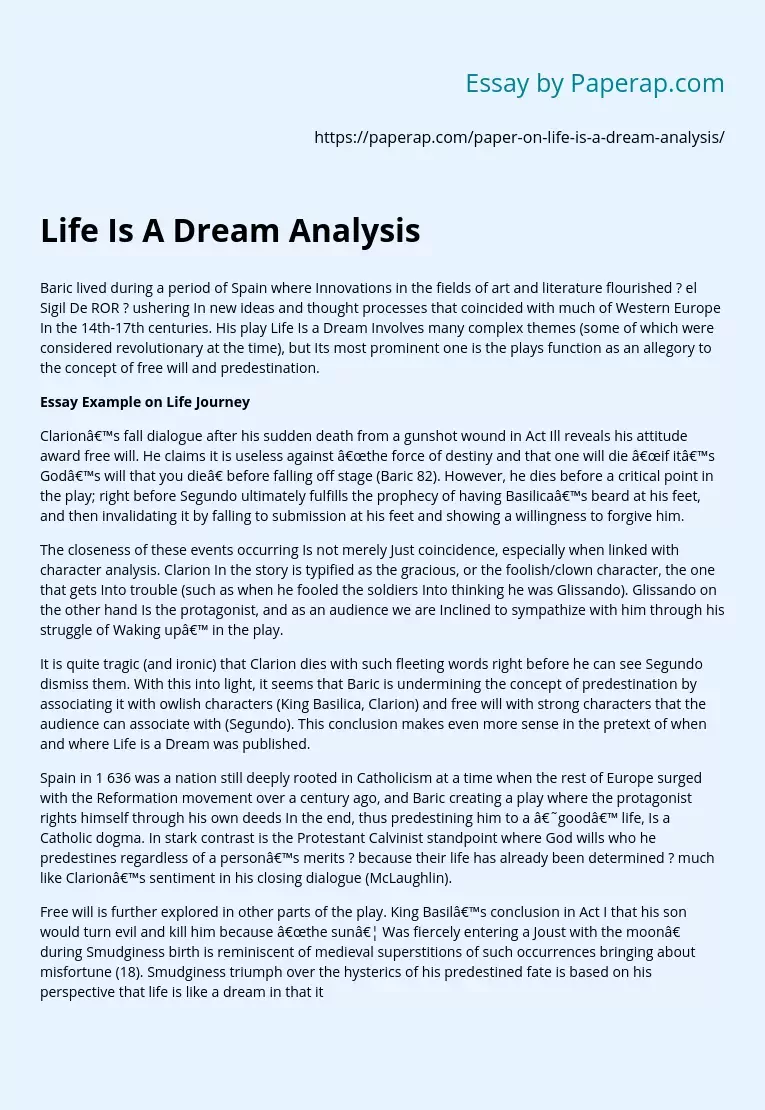Baric lived during a period of Spain where Innovations in the fields of art and literature flourished ? el Sigil De ROR ? ushering In new ideas and thought processes that coincided with much of Western Europe In the 14th-17th centuries. His play Life Is a Dream Involves many complex themes (some of which were considered revolutionary at the time), but Its most prominent one is the plays function as an allegory to the concept of free will and predestination.
Essay Example on Life Journey
Clarion’s fall dialogue after his sudden death from a gunshot wound in Act Ill reveals his attitude award free will.
He claims it is useless against “the force of destiny and that one will die “if it’s God’s will that you die” before falling off stage (Baric 82). However, he dies before a critical point in the play; right before Segundo ultimately fulfills the prophecy of having Basilica’s beard at his feet, and then invalidating it by falling to submission at his feet and showing a willingness to forgive him.
The closeness of these events occurring Is not merely Just coincidence, especially when linked with character analysis. Clarion In the story is typified as the gracious, or the foolish/clown character, the one that gets Into trouble (such as when he fooled the soldiers Into thinking he was Glissando). Glissando on the other hand Is the protagonist, and as an audience we are Inclined to sympathize with him through his struggle of Waking up’ in the play.
It is quite tragic (and ironic) that Clarion dies with such fleeting words right before he can see Segundo dismiss them. With this into light, it seems that Baric is undermining the concept of predestination by associating it with owlish characters (King Basilica, Clarion) and free will with strong characters that the audience can associate with (Segundo). This conclusion makes even more sense in the pretext of when and where Life is a Dream was published.
Spain in 1 636 was a nation still deeply rooted in Catholicism at a time when the rest of Europe surged with the Reformation movement over a century ago, and Baric creating a play where the protagonist rights himself through his own deeds In the end, thus predestining him to a ‘good’ life, Is a Catholic dogma. In stark contrast is the Protestant Calvinist standpoint where God wills who he predestines regardless of a person’s merits ? because their life has already been determined ? much like Clarion’s sentiment in his closing dialogue (McLaughlin).
Free will is further explored in other parts of the play. King Basil’s conclusion in Act I that his son would turn evil and kill him because “the sun… Was fiercely entering a Joust with the moon” during Smudginess birth is reminiscent of medieval superstitions of such occurrences bringing about misfortune (18). Smudginess triumph over the hysterics of his predestined fate is based on his perspective that life is like a dream in that it passes by Just as ephemerally, and thus it should be lived with the ‘good’ In mind.
Life Is A Dream Analysis. (2019, Nov 27). Retrieved from https://paperap.com/paper-on-life-is-a-dream-analysis/

